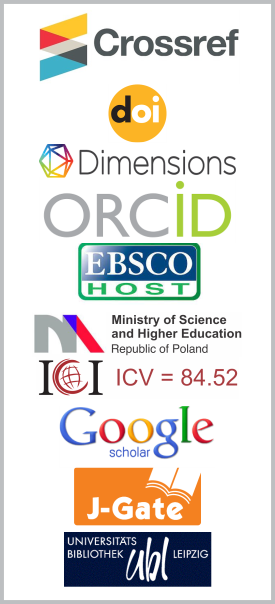Information Literacy Education (ILE) through School Project Work: Stories From Developing Country Teachers
DOI:
https://doi.org/10.26713/jims.v9i4.985Keywords:
Information Literacy (IL), Secondary schools, Project work, Teaching approaches, PlagiarismAbstract
This paper explores information literacy education (ILE) through a school project work in selected Malaysian schools. This qualitative study investigates how IL is taught by teachers and experienced by students on a big scale,nationwide-standardized school project. The research participants were five history teachers and twenty-three students from four schools. The data collection techniques employed were teacher's individual interview; students' focus group interview; document analysis (project journal and project report); and classroom observation. The findings show that while teachers employ five different teaching techniques to facilitate the students with their project, these efforts were geared towards accomplishing a predetermined learning output, rather than guiding students on how to do research. Teachers relied heavily on project guidelines to help the students produce a pre-determined project report, suggesting shallow research instruction. Results on students' project experience similarly reveal compelling evidence of students' preoccupation with the project guideline to produce their report. They only employed basic searching strategies and did not explore more sophisticated search techniques. The students used information mainly from the Internet resources that directly answered their project questions, and did not evaluate or filter information as suggested by IL models. They also were found to have serious problems concerning the ethical use of information. Further findings suggest that IL was not adequately delivered and integrated by teachers in classrooms. The findings are hoped to provide baseline information on IL development in less-developed countries where IL awareness is still minimal.Downloads
References
American Association of School Librarians (AASL) and Association for Educational Communications and Technology (AECT), Information Power: Building Partnerships for Learning, Chicago, American Library Association (1998).
C.C. Kulthau, A process approach to library skills instruction: An investigation into the design of the library research process, School Library Media Quarterly 13 (1985), 35 – 40.
H. Yu, S.A. Noordin, S.A. Mokhtar and A. Abrizah, Integrating Information literacy instruction (ILI) through resource-based school projects: An interpretive exploration, Education for Information 28(2-4) (2011), 247 – 268.
C.M. Jackson, The High School Library Web Site: Scaffolding Information Literacy Skills, Ph.D. thesis, Illinois State University, Illinois (2006).
I.A. Mokhtar, S. Foo and S. Majid, Guide me, show me: Personalized coaching as a means of instilling information literacy competencies in students, LIBRES 17(2) (September 2007), retrieved from http://libres.curtin.edu.au/.
H. Yu, A. Abrizah and A.S. Mad Khir Johari, Information literacy through resource-based learning: Malaysian teachers' conception and instructional practices, Malaysian Journal of Library & Information Science 21 (2016), 53 – 67.
H. Yu, A. Abrizah and R.M. Saat, Overcoming time and ethical constraints in the qualitative data collection process: A case of information literacy research, Journal of Librarianship & Information Science 46(3) (2014), 243 – 257.
H. Yu, Conception, Integration, and Experiences of Information Literacy Through Resource-Based Learning, Unpublished Ph.D. thesis, University of Malaya, Kuala Lumpur (2014).
Kementerian Pendidikan Malaysia, Buku Panduan Kajian Sejarah Tempatan Sekolah Menengah Rendah, Pusat Perkembangan Kurikulum (2002).
D. Williams and C. Wavell, Information literacy in the classroom: Secondary school teacher's conceptions, Final report on research funded by Society for Educational Studies, Research Report 15, The Robert Gordon University (2006).
E.M. Meyers and M.B. Eisenberg, Information behavior of grade 9 students: More and less savvy than you might think, Paper presented at the The International Association for School Librarianship Conference, Berkeley, CA (2008).
M.H.M. Tan and Y.L. Theng, Building information literacy through project work: A case study in Singapore, Paper presented at the Proceedings of the Asia-Pacific Conference on Library & Information Education & Practice, (A-LIEP 2006), Singapore.
S.C. Kong, A curriculum framework for implementing information technology in school education to foster information literacy, Computers & Education 51 (2008), 129 – 141.
K. Williamson, J. McGregor, A. Archibald and J. Sullivan, Information seeking and use by secondary students: The link between good practice and the avoidance of plagiarism, American Association of School Libraries (AASL), Retrieved 14 June 2008 from http://www.ala.org/ala/aasl/aaslpubsandjournals/slmrb/slmrcontents/volume10/williamson_informationseeking.cfm.
G. Hart, Project work as a vehicle for information literacy education in a circuit of South African primary schools, Paper presented at the Proceedings of the 66th IFLA Council and General Conference, Jerusalem, Israel 13-18 August 2000, Retrieved on 7 August 2009 from http://ifla.queenslibrary.org/IV/ifla66/papers/074-133e.htm.
Z.A. Bawi, Implementing Technology in Schools: Perception of Principals Towards the Implementation of Malaysian Smart School, Master thesis (2002).
S.A. Ismail, D.G. Dorner and G. Oliver, Local studies teachers' perspectives of Information literacy education in primary schools, Proceedings of 2012 International Conference on Education, Research and Innovation (ICERI 2012) Phnom Penh, September 2012.
J.S. Brown, A. Collis and P. Dugid, Situated cognition and the culture of learning, Educational Researcher 18 (1989), 32 – 42.
A. Collins, Chapter 4: Cognitive Apprenticeship, in The Cambridge Handbook of the Learning Sciences, R.K. Sawyer (ed.), Cambridge University Press, Cambridge (2006).
L. Limberg, Learning assignment as a task in information seeking research, Information Research 12(1) (2007).
Downloads
Published
How to Cite
Issue
Section
License
Authors who publish with this journal agree to the following terms:- Authors retain copyright and grant the journal right of first publication with the work simultaneously licensed under a CCAL that allows others to share the work with an acknowledgement of the work's authorship and initial publication in this journal.
- Authors are able to enter into separate, additional contractual arrangements for the non-exclusive distribution of the journal's published version of the work (e.g., post it to an institutional repository or publish it in a book), with an acknowledgement of its initial publication in this journal.
- Authors are permitted and encouraged to post their work online (e.g., in institutional repositories or on their website) prior to and during the submission process, as it can lead to productive exchanges, as well as earlier and greater citation of published work.




